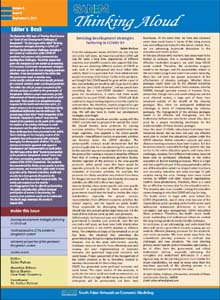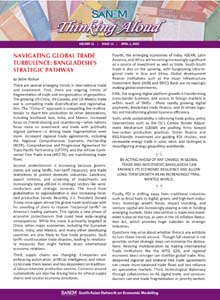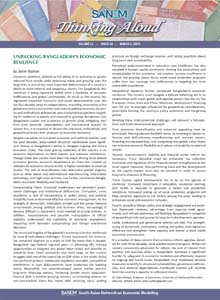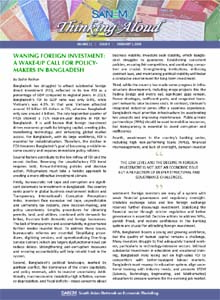
Thinking Aloud: Volume VIII, Issue 4: September 2021
 The September 2021 issue of Thinking Aloud focuses on “COVID-19 and development strategies”. The first page article titled “Devising development strategies factoring in COVID-19” analyses the development challenges emerging in the context of continuation of the COVID-19 pandemic and proposes policy frameworks for tackling these challenges. The article argues that given the emergence of new variants of coronavirus, it is necessary to formulate development strategies which can cope up with the ever-changing pandemic situation. It has been proposed in the article that the government needs to develop some sector-specific protocols and area-specific protocols for economic activities under a prolonged pandemic. The article also calls for proper assessment of the stimulus packages provided by the government of Bangladesh. Without a proper assessment, further disbursement of stimulus packages would not yield expected result. There needs to be strengthened policy response for the social sectors, if a robust recovery is to be ensured. Most importantly, institutional deficiencies need to be addressed. The second and third pages of this issue present two more articles. The second page article titled “Youth perspective of the pandemic: Bangladesh context” looks into the impact of the pandemic on the youth of the nation. An analysis of the existing challenges to youth development and the effect of the pandemic on those challenges have been presented in the article. These challenges in the emerging context of the pandemic have to be countered with strategies leveraging the demographic dividend. The article stresses on inclusive approach with regard to development and implementation of youth policy. The third page article titled “Gendered perspective of the pandemic: Bangladesh context” delves into the issues surrounding gender inequality in the context of the COVID-19 pandemic. The pandemic has exacerbated the divides across gender in society and economy, and reversed the gains made in terms of gender parity. Women’s education, health and security have been greatly disrupted by the pandemic and the associated structural shifts. The article puts emphasis on the need for sex-disaggregated data for effective policymaking. The article concludes that, without increased participation of women in the planning, the recovery from pandemic would not be sustainable. The fourth page showcases the events in August 2021.
The September 2021 issue of Thinking Aloud focuses on “COVID-19 and development strategies”. The first page article titled “Devising development strategies factoring in COVID-19” analyses the development challenges emerging in the context of continuation of the COVID-19 pandemic and proposes policy frameworks for tackling these challenges. The article argues that given the emergence of new variants of coronavirus, it is necessary to formulate development strategies which can cope up with the ever-changing pandemic situation. It has been proposed in the article that the government needs to develop some sector-specific protocols and area-specific protocols for economic activities under a prolonged pandemic. The article also calls for proper assessment of the stimulus packages provided by the government of Bangladesh. Without a proper assessment, further disbursement of stimulus packages would not yield expected result. There needs to be strengthened policy response for the social sectors, if a robust recovery is to be ensured. Most importantly, institutional deficiencies need to be addressed. The second and third pages of this issue present two more articles. The second page article titled “Youth perspective of the pandemic: Bangladesh context” looks into the impact of the pandemic on the youth of the nation. An analysis of the existing challenges to youth development and the effect of the pandemic on those challenges have been presented in the article. These challenges in the emerging context of the pandemic have to be countered with strategies leveraging the demographic dividend. The article stresses on inclusive approach with regard to development and implementation of youth policy. The third page article titled “Gendered perspective of the pandemic: Bangladesh context” delves into the issues surrounding gender inequality in the context of the COVID-19 pandemic. The pandemic has exacerbated the divides across gender in society and economy, and reversed the gains made in terms of gender parity. Women’s education, health and security have been greatly disrupted by the pandemic and the associated structural shifts. The article puts emphasis on the need for sex-disaggregated data for effective policymaking. The article concludes that, without increased participation of women in the planning, the recovery from pandemic would not be sustainable. The fourth page showcases the events in August 2021.



